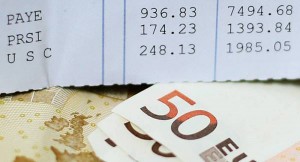In political phraseology terms, ‘the national interest’ has been subsumed by talk of ‘recovery’ and ‘stability’ by the ruling parties in the build-up to the general election.
In another few weeks, we ordinary Joes and Josephines shall require recovery time to cope with all the references to recovery the coalition will inundate us with as they seek re-election.
And no doubt the narrative from the opposition benches will include talk of a wasted recovery, a bias towards the well-off, of the need for a revolution in Irish politics, and the opportunity of establishing a Socialist Irish Republic in this year of all years.
Yet, a few months from now, I suspect we’ll be back to the punch and judy of Dáil exchanges and the ongoing failure to make better use of the Seanad.
Irish voters have, up to now, rarely been driven to exercise their suffrage in purely ideological terms.
And when it comes to general elections, I would contend that the majority of the voting public (as distinct from the general populous) end up grouped largely in the centre, or slightly left or right of centre.
Brendan Ogle, who has articulately led the Right2Water/Right2Change movement, disagreed with me on this point when we discussed the political lie of the land a few weeks ago, arguing that a right wing agenda has dominated our administrative history.
Political ideology is never something we’ve been too big on in a modern political context, and that the discourse of recent weeks has been dominated by talk of tax cuts reflects how politicians largely consider voters in: fiscal terms.
It’s all about what they can put back into our pockets, supposedly, and by talking about something universally derided – the Universal Social Charge – politicians know they’re on safe ground. That’s not ideology: that’s keeping things between the ditches.
Amidst all the 1916 narrative which is, thankfully, a great deal more enlightened than the dominant discourse of a half century ago, the one thing that can be largely agreed on from that time was the need to establish national self-determination.
Granted, Redmonites weren’t as readily keen for an immediate break from colonialism as Arthur Griffith’s Sinn Féin was, but the ultimate endgame for both was an ultimate pursuit of the same goal: independence. The importance of the right to vote and the significance of electing our own parliament, is, surprisingly, not high on the pervading 1916 narrative at present.
To throw another political heavyweight into the midst when he negotiated in Downing Street, the upheaval of the 1916-1922 era provided the freedom to achieve the ultimate freedom. Granted, what Michael Collins clearly coveted (no different from Eamon De Valera): a 32-county Republic, appeared impossible to achieve without an even bloodier civil war and the complete subjugation of the Ulster Unionist population.
And given the exodus of protestants from the Free State in the years following independence, it is impossible to consider the prospect of an agreed all-island State a century ago without a substantial loss of life.
But let’s save that discussion for future columns and return to the pending general election, and the relationship between politicians and the habitual voter.
“But sure everybody hates politicians! Old people are not any different. The ordinary guy in the pub thinks politicians are all crooked and so on. That’s not confined to young people. That’s a healthy cynicism and distrust which most modern democracies – and certainly the Irish people – have always had – at all ages.
“They’re tremendous politicians, the Irish people. They’re fascinated with politics. The ordinary guy in the pub can talk more intelligently and more wisely and with more depth about politics than anybody in any country in the world…
“I think politicians are hard done by, but then everybody thinks that about their own profession, I suppose. I don’t think the criticism of politicians are very well balanced, Nobody ever sets out to try and describe a politician in the round, and say, okay, maybe he’s very wrong about this, but at least he’s trying to do that. But then there’s no point in complaining about that. That’s part of political life – to be attacked and criticised, Very often, in one’s own view, almost continually wrongly…
“There’s no such thing as ‘ordinary people’: there’s just people, but people are not fooled by all of this. I know that I have a perfectly good relationship with people, my constituency. They know me. I know they trust me and I think they like me. They don’t think I’m a bad person or am out to do anything detrimental to them or to their interests. That is the compensation for when you read something in the paper that you know is unfair – grossly unfair – and wrong. And when it happens you’re inclined to get outraged and angry about it, and upset about it. But that’s only passing.”
Not much has changed in the 32 years since Charles Haughey, then leading the opposition, told John Waters the aforementioned in an infamous ‘Hot Press’ interview.
Comparing them purely within the context of the above quotes, it’s not too outlandish to imagine Enda Kenny speaking in similar terms now, over three decades later.
CJ Haughey, I would argue, gave us Irish too much credit when it comes to political savvy. And if any politician makes positive noises about tax reform on our doorsteps in the coming weeks – i.e. and says what we want them to say – then I wonder how ‘sophisticated’ any of us will be come election day.


